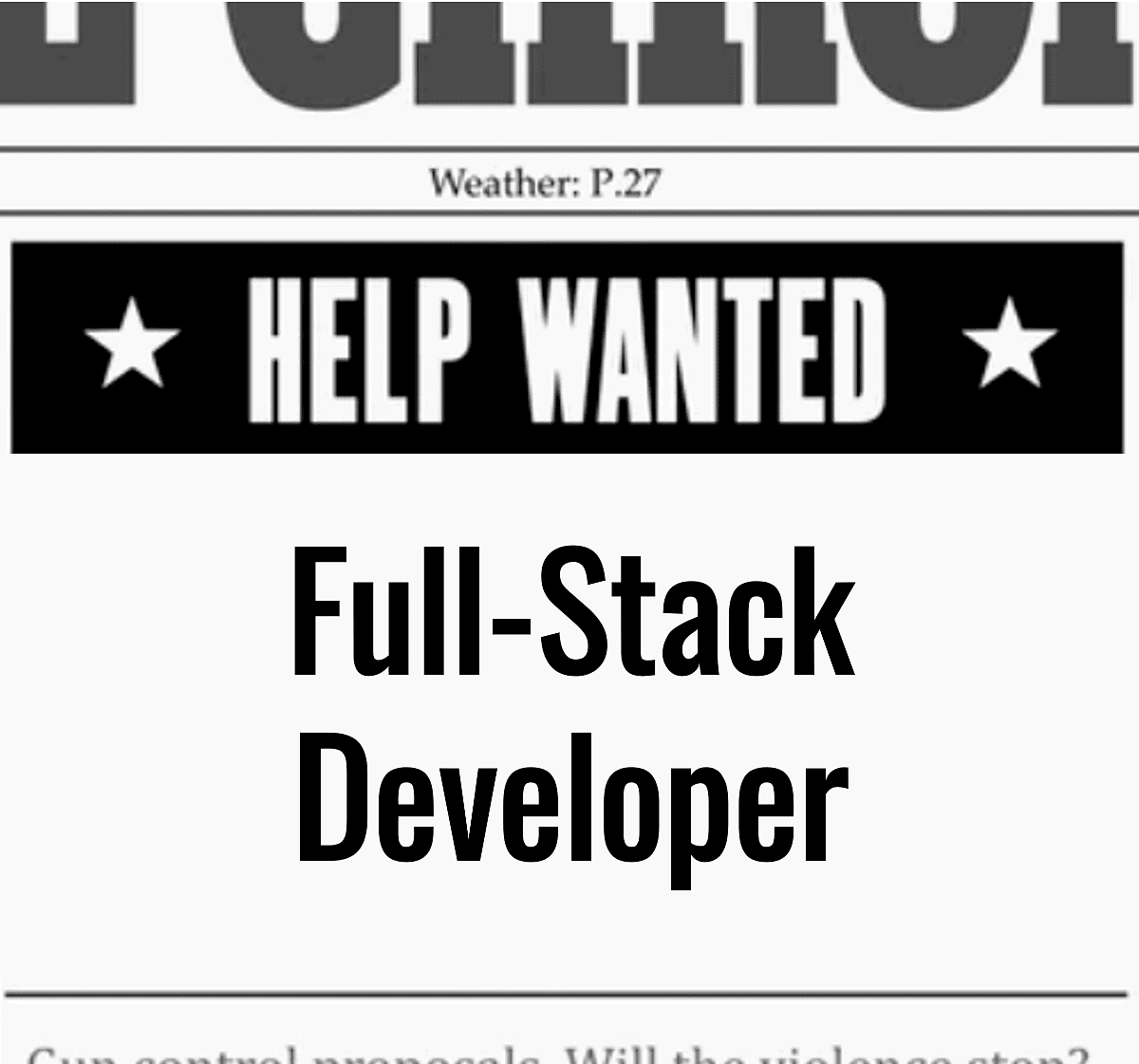What is a full-stack software developer?
A full-stack software developer is someone capable of working in each layer of software development. This is what makes them some of the most sought-after talent in the industry. Here’s a quick refresher on what those three layers are:
Front-end
Back-end
Database
What does a full-stack developer do?
Though there’s still some debate about what \”full-stack\” means for developers, there’s no doubt that they’re in high demand for good reason. Full-stack software developers often have unmatched skills, including a wide range of coding niches and UI/UX management. These things make it possible for them to jump in at several points throughout the development process.
Some of the responsibilities for a full-stack software developer include:
Helping with development and design
Writing code for the front-end and back-end
Considering maintenance, scalability, and security when developing
Testing and debugging
Creating databases and servers
Ensuring compatibility for cross-platform use
Designing new features
Maintaining responsiveness of software applications
Developing RESTful and APIs services
Optimizing software to keep up with technological advances
Full-stack software developers are widely considered some of the best and most technical developers in the IT industry. They add a lot of value to the team and can provide valuable insight throughout the development process because of their technical skill sets and high-powered delivery. However, because they have such a wide range of skills, they can be hard to find. When hiring a software delivery professionals, in whatever phase your project is in, full-stack developers are a coveted role.

Here at Unosquare, we understand the importance of having the right talent to work on your project. We are routinely asked for full-stack developers and have an expansive recruitment team that helps source them for our clients. Here’s why your team needs a full-stack software developer and what you should know about the role.
What is a full-stack software developer?
A full-stack software developer is someone capable of working in each layer of software development. This is what makes them some of the most sought-after talent in the industry. Here’s a quick refresher on what those three layers are:
- Front-end
- Back-end
- Database
Seems simple enough, but mastering all three components is no easy feet. It takes natural skill, the right mindset, and the desire to continuously learn and even more importantly, to teach. Full-stack developers can the be the anchors for a development team and often times take on Tech Lead roles. Do be successful, they need both hard and soft skills, coupled with the ingenuity needed to consistently deliver.
Now, let’s look at each layer in a bit more detail.
The Front-end layer
This is the part of an application or website that the end-user sees. It includes all software in which the user interacts.
The Back-end layer
This layer is the part of the application or website that is hidden from users. It’s what happens behind the scenes to make what the users see possible.
The Database layer
When a user requests something, that information is retrieved from the database. This is what makes up the database layer.
What does a full-stack developer do?
Though there’s still some debate about what “full-stack” means for developers, there’s no doubt that they’re in high demand for good reason. Full-stack software developers often have unmatched skills, including a wide range of coding niches and UI/UX management. These things make it possible for them to jump in at several points throughout the development process.
Some of the responsibilities for a full-stack software developer include:
- Helping with development and design
- Writing code for the front-end and back-end
- Considering maintenance, scalability, and security when developing
- Testing and debugging
- Creating databases and servers
- Ensuring compatibility for cross-platform use
- Designing new features
- Maintaining responsiveness of software applications
- Developing RESTful and APIs services
- Optimizing software to keep up with technological advances
When do you need a full-stack software developer?
Having the talent of a full-stack developer is an asset, but before you hire, you need to figure out how they’ll fit into your team. Here are some instances when it’s helpful to bring in a full-stack developer.
When you need a minimum viable product
Full-stack software developers are a great choice when your operation is lean, and you need to validate ideas by building a minimum viable product. Many of these developers will help you take an idea or feature and bring it into production quickly and efficiently.
When you need additional expertise
Full-stack developers can help you make better business decisions around your project. Since they have such a wide range of skills, they bring a lot of knowledge to the table, and their input can impact your success. Self-management and leadership are also critical skills to assess when looking for someone to fill this role. They need to stay motivated and motivate others by example.
When you have a small team
If you can’t hire a specialist for each layer of the software development process, full-stack developers are the right people to bring in. One good full-stack developer can work with you on many aspects of your project. While they may be more expensive than other software talent, they also have more experience. This additional experience makes it possible to fill in gaps in several different areas.
What should companies look for in a full-stack developer?
Once you know you want to work with a full-stack developer, the next question is: What do you need to look for in this person? Knowing the answer is key to bringing in a developer who will accomplish what you want. Here’s what we recommend.
The talent your project requires
You don’t need just any full-stack developer. You need one that has the right expertise and relevant experience in your business domain. Go beyond the title and make sure that the developer will meet the needs for your specific project and goals.
Quality over price
Budget is important, but it’s not the only element to consider when hiring full-stack developers. A good quality full-stack developer is likely to come in at a high price, especially in such a competitive market. According to data from Indeed, the average salary for a full-stack developer is $106,622 in the United States. Keep that in mind as you compare different developers to fit the role. If your budget does not allow for on-shore talent, near-shore options like Unosquare can help find you this talent at a reduced cost, but without suffering quality. Developers with advanced skills typically have strong communication skills if your native language is not theirs, they can adapt.
Good communication skills
Full-stack software developers will likely need to meet with clients, report progress to company stakeholders, and talk with other developers. To do this effectively, they’ll need to be a strong communicator. Both speaking and listening skills are essential here.
These soft skills can make or break the success of your project, so you mustn’t overlook them. To learn more about communication and software development, read this post: 5 Proven Ways to Promote Communication in Your Software Development Team
What technology stacks are commonly used by full-stack developers?
Another good thing to know before bringing in a full-stack software developer is what technologies they typically work with. These are the technology stacks that full-stack software developers commonly use:
Front-end technologies:
- HTML/HTML5
- CSS
- JavaScript
- JQuery
Front-end frameworks:
- Angular.Js
- Backbone.Js
- Ember.Js
- Polymer.Js
Back-end technologies:
- Ruby On Rails
- Node.Js
- PHP
- .NET
Back-end frameworks:
- Rails
- Express
- ASP.NET
- CodeIgniter
Database development technologies:
- MySQL
- PostgreSQL
- MongoDB
- Oracle
- Microsoft SQL Server
Bringing top talent into your organization with Unosquare
Trying to figure out what you need to execute your next software project? Choosing the right methods and the right partner for your project can make a big difference. If you need help with your upcoming project, we can help. Here at Unosquare, we have over 2,000 completed projects and over 600 engineers. We also have more than 120 distributed teams.
Our company knows what it takes to meet and exceed project needs. Want to learn more about what Unosquare can do for your company? Check out our blog to get more information on what we do and our expertise.

